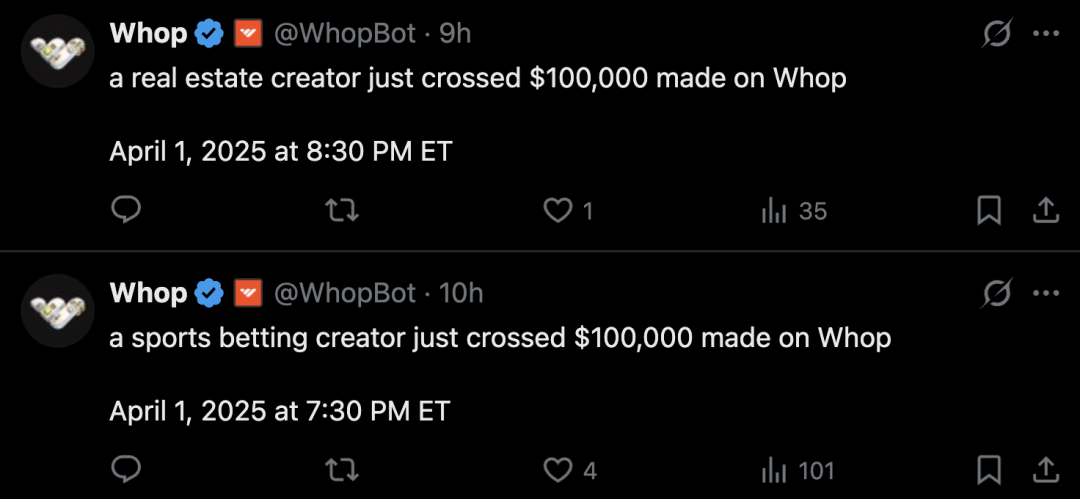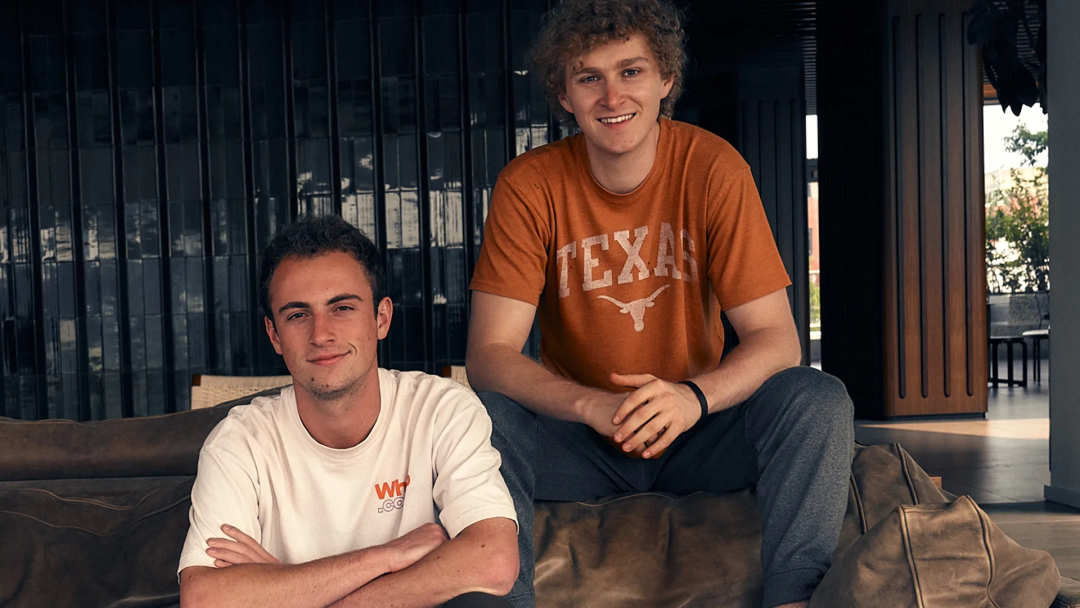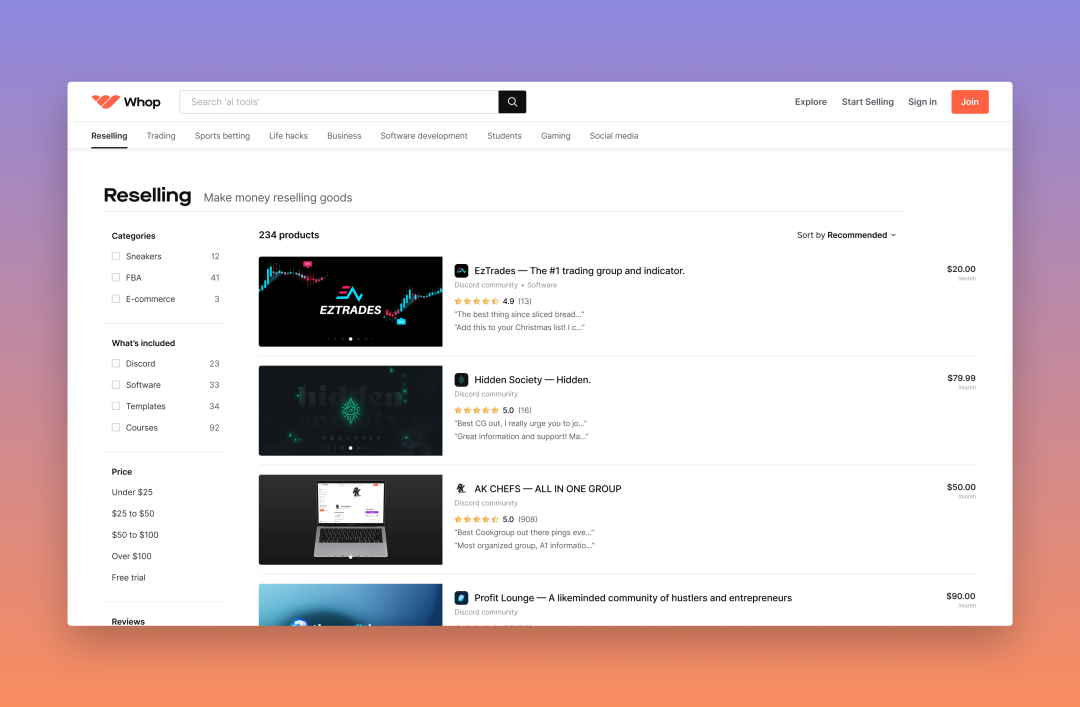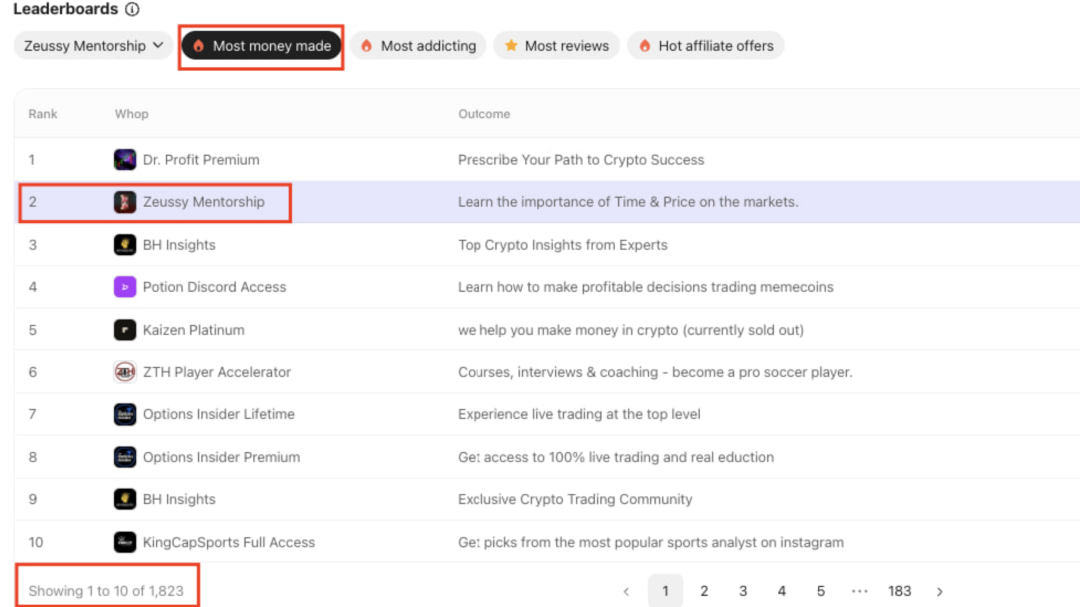Three post-95s jointly build a unicorn enterprise, the next American version of "Xiaozhi"
![]() 04/03 2025
04/03 2025
![]() 412
412
On Whop, everything can be sold.
"At 4:04 pm on March 28, a creator's income on Whop just exceeded $1 million."
"At 4:30 pm on March 28, a creator's income on Whop just exceeded $100,000."
"At 10:00 pm on March 28, a social media creator's income on Whop just exceeded $100,000."
A mysterious X account is real-time recording the income milestones achieved by independent creators on the trading platform. Every day, users can see 5-6 creators happily appearing on the rankings, which means their income has reached $100,000 or even $1 million.

This trading platform is called Whop. What exactly is Whop, which frequently makes creators money? In fact, Whop is a digital product trading platform founded by three post-95s in 2020. The founders are Steven Schwartz, Cameron Zoub, and Jack Sharkey.
Sales platforms are not rare in the United States. Today, Amazon has monopolized online physical goods, Steam mainly sells games and their supporting software, and Shopify focuses on selling digital goods such as art services or dramas. However, Schwartz and Zoub cleverly discovered that there is still a large market space for digital product sales and the digital economy behind them.
On Whop, everything can be sold.
Whether it's digital collectibles, teaching lesson plans, food coupons, or hotel membership benefits, they can all be sold on Whop. It is revealed that over 2 million users purchase digital products, courses, online communities, agency services, tutoring, etc., every week. However, Whop also extracts a commission fee of 3%-5% from each transaction, and even the commission fee for transactions reached through homepage recommendations can reach 30%.
According to The Information, this four-year-old company's annual turnover has tripled in less than a year, from $35 million last spring to $90 million this year.
Currently, Whop has attracted over 5 million customers, held 800 million online events, and its transaction volume has exceeded $1.1 billion. What is the current state of the digital trading platform market in the United States? How does Whop leverage a small team of 20+ to tap into a multi-billion-dollar market? We explore the story behind Whop's entrepreneurship and see how Whop activates fragmented consumer demand through precise traffic distribution.

Earned first pot of gold at 13 by developing shoe-snatching software
Initially wanted to rectify the software trading market
Steven Schwartz did not come from a wealthy family. He was born into a military family, with his father being a soldier and his mother a doctor.
He moved frequently with his parents when he was young, making new friends in different places and meeting people with profound insights. He often learned about different ways of thinking from these people. When he was young, he also went to China, worked in Singapore, and finally went to New York University for further studies in Paris.
At the age of 13, he met Cameron Zoub on Facebook, and they jointly developed a bot software for snatching limited-edition sneakers at key moments.

Steven Schwartz(left) and Cameron Zoub(right)
After earning their first pot of gold, they tried to develop more sales software online. Before Whop, they collaborated with software developer Sharkey to develop a software store platform for small businesses. Here, users can purchase software for free and also sell their own software for free.
However, as more and more scammers poured in, the software store platform became a "nest" for many criminals to steal information.
"It's garbage," Schwartz bluntly said. "People have to post on forums and often get scammed. They also need intermediaries, and the pricing of software is unclear."
It was the chaos in transactions on this software store platform that made Schwartz and Zoub determined to create a product service platform that allows people to buy and trade freely with peace of mind. This is also the story of Whop's inception.

Competing with traditional social media
Algorithms and experience become the core of competition
In Schwartz's view, Whop's competitors are traditional social media because Whop's target audience is content entrepreneurs and influencers.
"We are competing with social media. People traditionally sell their software through social media but encounter extremely unsatisfactory experiences," Schwartz said. "We are now creating a new economy and providing people with new things to sell."
Seller users can upload their products, such as sales manuals, industry research reports, and coupons, to the Whop platform. Moreover, they can understand their situation through customer relationship management tools and business insight analysis dashboards. Buyer users can discover new products with the help of recommendation algorithms and manage their purchase lists.
This also provides content creators with a new commercialization idea.
In the past, content creators earned profits through sponsorships or advertisements on traditional social media channels such as X and YouTube. But now, they can provide some content products on the Whop platform to obtain a continuous and stable source of income.

Unlike traditional media, users with 20,000 followers on the Whop platform can earn more income from content products than content creators with 100,000 followers. Here, the number of followers is not the only key to determining profitability.
A survey study once showed that some buyers are more likely to purchase products recommended by influencers they trust. 49% of consumers rely on influencer recommendations, while 40% of consumers say they will choose to purchase something interesting they see on Twitter, YouTube, or Instagram, not entirely relying on influencers. This also means that fans' trust in influencers or their influence on purchasing power.
Which groups contribute the most sales to Whop?
Merritt Hummer, a partner at Bain Capital Ventures, said that from last year, the customers driving the most growth were those selling resale, sports betting, cryptocurrency trading, and options trading tips and guides. These four types of transactions accounted for half of Whop's total sales.
However, there are currently many "get-rich-quick secrets" related to cryptocurrencies and finance on the Whop platform. How to determine whether these content reports are true or false? Will it be another new scam?
Whop said they have taken measures to deal with this situation. Like Amazon, Whop has created a "dispute review platform". If a user's negative feedback reaches a certain level, the seller's account will be closed. Buyer users can initiate disputes on the platform, and merchants respond to them. If they do not respond within the specified time, the buyer users will receive a refund.
User purchasing behavior will also become part of the seller's performance record. Schwartz believes that if deceived customers do not have a good experience, the platform must ensure that their money is returned to them, and no one else can continue to purchase. The platform must establish a good feedback system in terms of setting up mechanisms and be able to fully and transparently express the creator's intentions in order to form a positive feedback loop.
Whop has gradually expanded its team, with a team size of around 20 at the end of 2023 but now expanded to 80. More than half of their team members have set up their own account platforms on the Whop platform and even become millionaires through Whop in their 20s. They even have an internal ranking to see who earns the most money within the company.
Currently, Whop is also seeking a new round of funding to accelerate team expansion.

Set up a 24-hour real-time income ranking
Money is a good medicine to motivate creators
Although users come to Whop for commodity transactions, Schwartz prefers to position Whop as a social platform. In his view, the best way to build a social platform business is through actual connections and true understanding. "Your customers know who you are, just like an ancient market. You go there every day, and you really know everyone on the market. You trust them, and you also know that others buy from them. This is an era of specialization, like a farmer in a farmer's market."
According to Schwartz, users on the Whop platform now earn about $1 billion a year, and Whop's own revenue is around $100 million.
Whop charges a 3% commission on commodity transactions, but the founders of Whop said that the commission varies depending on the transaction type. Currently, about 70% of the company's payment business comes from the United States. However, they have recently seen growth in Asia, and they are eager to expand into the Asian market in the future.
Whop puts how much money people earn on this platform in the most prominent position. Whop has even set up different rankings for different types of products or different ways to make money, such as affiliate rankings, creating a truly gamified and transparent experience.

Users can directly view any results of anyone or any product, see how much money they earned today, and provide ideas for their content works. "Every YouTuber, especially those around me, says the first thing in the first 30 seconds of their video is how much money they made?"
In addition, at the beginning of the ranking design, Schwartz felt that people sometimes need some incentives.
"I think the real reason is that it's hard to know if someone's success is real. You really don't know if someone is completely bullshitting or if they actually have some examples of success to support it. Our whole goal is to make people money. If we can't establish a very clear way for people to know their progress in the entrepreneurial process, then we haven't fulfilled our responsibility." Schwartz said.
In the survey, they found that the creator community prefers platform-verified accounts with $1 million in certification rather than verified accounts with one million followers.
Whop has created a developer ecosystem and plans to help creators focus on solving one problem. "I'm very passionate about supporting developers in making money. I believed in my childhood that developers are very creative. Many times, they just lack clarity on what to build," Schwartz said.
Whop is also developing a desktop Stak application to ensure that creators have at least a basic platform to do some basic things, such as creating their own mini-programs, voting systems, or interactive games.








